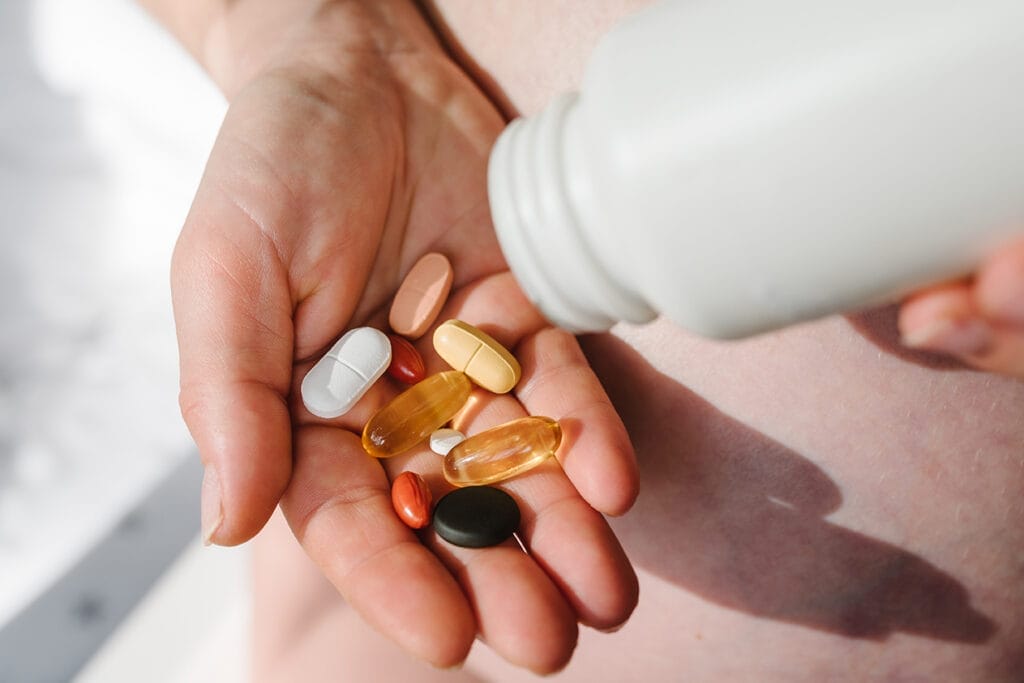Vitamin D – The sunshine vitamin and its role in gut health
Often called the sunshine nutrient, Vitamin D is known for its critical role in maintaining healthy bones by aiding calcium and phosphorus absorption. However, its influence extends far beyond skeletal health due to the amount of vitamin D receptors (VDRs) found in almost every cell in the human body. Vitamin D’s role in maintaining health is widespread, as it has been shown to play a pivotal role in digestive health, from gut microbial balance to inflammation control. Vitamin D is a key player among the many factors that influence digestive health, particularly in cases of inflammatory bowel disease (IBD) and irritable bowel syndrome (IBS).

Vitamin D and gut health
Trillions of dynamic and diverse microbes with thousands of different species, inhabit the human gut essential for immune modulation, pathogen protection, nutrient metabolism, providing structural integrity of the mucosal barrier, influencing our emotions, thoughts and feelings via the gut-brain axis and so much more. [i] The gut microbiota is considered an ‘extra organ’ as it has many crucial roles in maintaining essential functions required for optimal health.
Vitamin D is essential for our microbes to function, significant associations between vitamin D and the gut microbiota have been discovered in various studies where a shift in microbial composition was observed during Vitamin D supplementation.
Vitamin D deficiency has been associated with an increase in the presence of pathogenic bacteria and a decrease in beneficial bacteria (dysbiosis), which can lead to gut inflammation and disease.
Inflammatory bowel disease and vitamin D
Inflammatory bowel diseases (IBD) such as ulcerative colitis and Crohn’s affect an estimated 3.1 million adults in the USA and a further 1.3 million in Europe. Globally the incidence of IBD is increasing, particularly in newly industrialised countries. These diseases are characterised by chronic inflammation of the gastrointestinal tract (GIT) with diet and lifestyle emerging as significant determinants in IBD prevention and management.[ii] Cumulative antibiotic exposure has also been associated with an increased risk of IBD and was highest among individuals aged 40 years and older. [iii]
Vitamin D plays a significant role in modulating the immune response and controlling inflammation. It enhances the production of anti-inflammatory cytokines while suppressing pro-inflammatory cytokines, thus maintaining a balanced immune response. Low serum levels of the major circulating form of Vitamin D 25-hydroxyvitamin D(25-OH-D), are significantly more prevalent in patients with IBD, particularly in the winter and spring months.
Inflammation in the intestinal tract can lead to poor malabsorption of nutrients including Vitamin B12, Vitamin D, calcium and others. Vitamin D status not only plays a role in inflammatory bowel disease but also functional bowel disorders such as IBS.
Irritable bowel syndrome (IBS) is a common disorder that presents with a cluster of symptoms including abdominal pain, diarrhoea, constipation and uncomfortable bloating. One of the main contributory factors in IBS is a dysfunctional intestinal (epithelial) barrier often referred to as ‘intestinal permeability’ or ‘leaky gut syndrome’. The gut lining is composed of cells held together by tight junctions, which act like gatekeepers, controlling what can pass through into the bloodstream. When these tight junctions become damaged or weakened, they can no longer effectively block harmful substances. As a result, larger particles, such as toxins, undigested food, and bacteria, can “leak” through the gut lining and enter the bloodstream.
The intestinal barrier can be damaged by many factors such as food insults (gluten, casein, etc), toxins, viruses, infections, past antibiotic use, certain medications as well as lifestyle factors such as stress that can alter the permeability of this important intestinal protection.
Research has shown a link between low Vitamin D levels and the onset or worsening of IBS symptoms and that Vitamin D plays an important role in gut health, especially the health of the intestinal barrier. [iv]

Enhanced gut barrier function
The intestinal epithelial cells make up the lining of the intestine and play several roles in maintaining digestive health and overall homeostasis by –
- Forming a physical barrier to prevent harmful substances such as pathogens, toxins and undigested food particles from entering the bloodstream.
- Form what are called tight junctions which seal the gaps between the cells, helping to regulate the permeability of the intestinal barrier and monitoring what can pass through
- Nutrient absorption from digested foods facilitates the uptake of nutrients
- Help to balance our electrolytes
- Regulate inflammation
- Produce a protective layer of mucous on the intestinal lining to not only trap pathogens but to protect the barrier from insults
Vitamin D has been shown to regulate gut homeostasis by maintaining the integrity of the epithelial barrier by influencing the intestinal microbiome, controlling inflammation and controlling innate and adaptive immunity in the gut via VDRs[v]
VDRs are found in most cells of the body, including those found in the gut that play a key role in regulation, therefore Vitamin D is crucial to support gut health, we need to maintain adequate levels throughout the year using a combination of diet, sunlight exposure, and supplementation where needed.
Vitamin D can be a simple, yet powerful step towards controlling IBD and enhancing overall gut health.
References
[i] Bull MJ, Plummer NT. Part 1: The Human Gut Microbiome in Health and Disease. Integr Med (Encinitas). 2014 Dec;13(6):17-22. PMID: 26770121; PMCID: PMC4566439.
[ii] https://www.clinicaleducation.org/digestive-health/lifestyle-factors-for-the-prevention-and-care-of-people-with-inflammatory-bowel-disease/
[iii] Faye AS, Allin KH, Iversen AT, Agrawal M, Faith J, Colombel JF, Jess T. Antibiotic use as a risk factor for inflammatory bowel disease across the ages: a population-based cohort study. Gut. 2023 Apr;72(4):663-670. doi: 10.1136/gutjnl-2022-327845. Epub 2023 Jan 9. PMID: 36623926; PMCID: PMC9998355.
[iv] https://www.healthline.com/health/ibs/vitamin-d-and-ibs#vitamin-d-deficiency-and-ibs
[v] Akimbekov NS, Digel I, Sherelkhan DK, Lutfor AB, Razzaque MS. Vitamin D and the Host-Gut Microbiome: A Brief Overview. Acta Histochem Cytochem. 2020 Jun 26;53(3):33-42. doi: 10.1267/ahc.20011. Epub 2020 Jun 16. PMID: 32624628; PMCID: PMC7322162.







